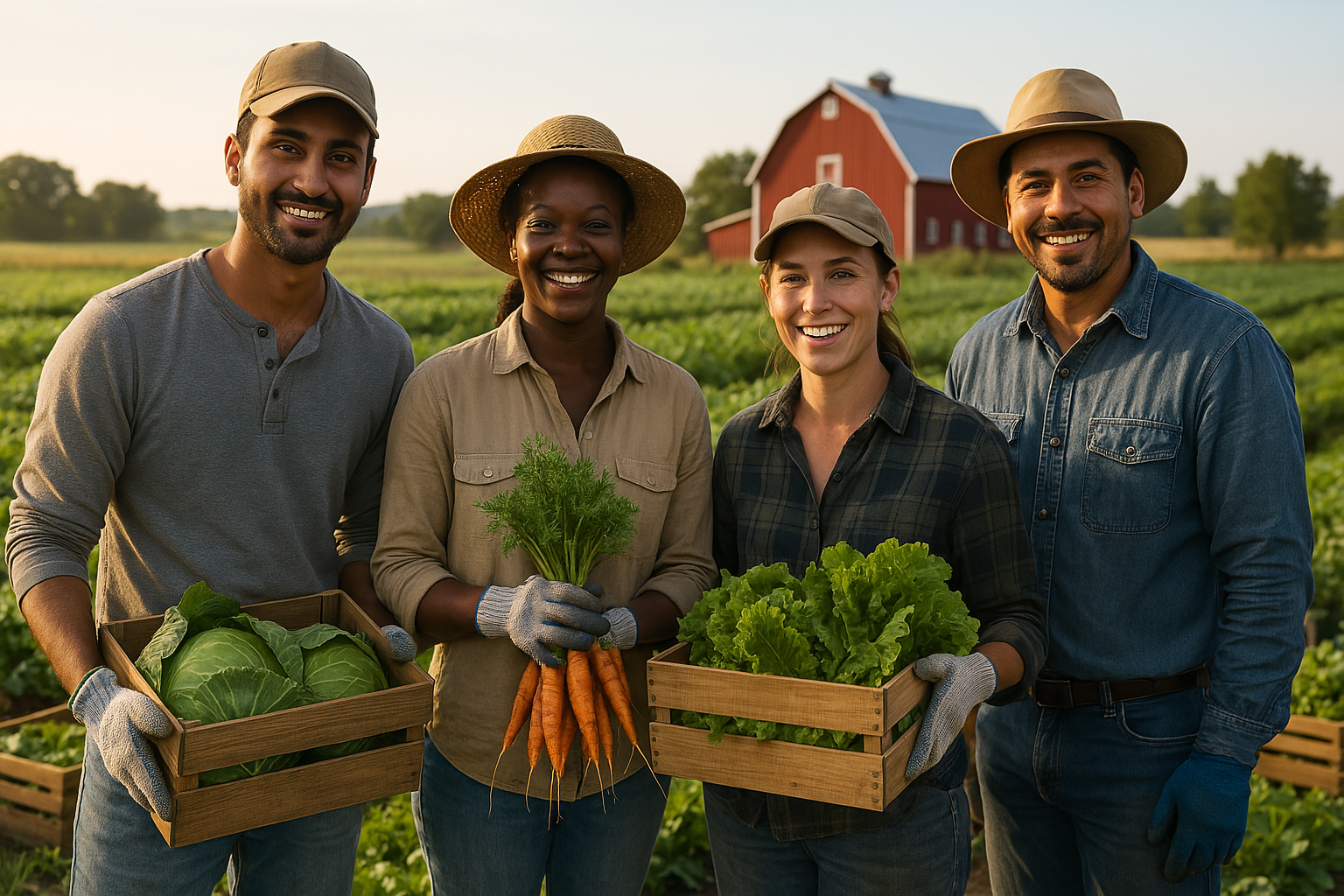Introduction: A Fresh Start with Big Potential
Looking for a job opportunity in Canada that doesn’t require a degree or prior experience? You’re not alone—and you’re in the right place. In 2025, Canada farm worker jobs for foreigners with no experience are among the most accessible and in-demand roles for individuals seeking work abroad.
These jobs offer more than just a paycheck. They provide a legal route into Canada, valuable hands-on experience, and—best of all—a potential pathway toward permanent residency.
In this guide, we’ll walk you through everything: who can apply, how to apply, what to expect, and how farm jobs can open doors for your future in Canada.
Why Farm Worker Jobs Are a Great Opportunity for Foreigners
Growing Labor Shortage = High Demand
Canada’s agriculture sector plays a massive role in feeding the country—and parts of the world. But local workers aren’t filling the roles fast enough.
That’s why the Canadian government and employers are actively hiring foreign agricultural workers through seasonal and full-time positions, many offering visa sponsorship or entry through the Temporary Foreign Worker Program (TFWP).
No Experience Required
Unlike many jobs, you don’t need a resume full of experience to qualify. In fact, many farm owners specifically state: “No experience necessary—we’ll train you.”
All you need is:
- A strong work ethic
- Willingness to do physical labor
- Basic communication skills (English or French)
- Eligibility to work in Canada
Who Can Apply for Farm Worker Jobs in Canada?
Eligibility for Foreign Applicants
You can apply for farm worker jobs in Canada if you:
- Are 18 years or older
- Are physically fit and able to work outdoors
- Have basic knowledge of English or French
- Hold or can obtain a valid passport
- Qualify under work permit programs (e.g., TFWP, Seasonal Agricultural Worker Program)
Bonus: Some employers may offer LMIA-approved jobs (which are eligible for visa sponsorship).
Job Roles Available for Farm Workers in Canada
Common Positions That Don’t Require Experience
Whether you’re harvesting fruits or caring for livestock, the Canadian agriculture industry has a wide variety of entry-level roles, including:
- Fruit & vegetable pickers
- Greenhouse laborers
- Crop harvesters
- Dairy farm workers
- Poultry farm attendants
- Packing and sorting workers
- Tractor or equipment assistants (training provided)
These jobs often follow seasonal cycles, meaning some roles are available only from spring through autumn, while others are year-round.
What You Can Earn: Salary & Benefits
Farm Worker Salaries in Canada (2025 Estimates)
| Role | Hourly Wage | Monthly Earnings |
|---|---|---|
| Fruit Picker | CAD $15 – $18 | CAD $2,400 – $2,880 |
| Greenhouse Worker | CAD $16 – $20 | CAD $2,560 – $3,200 |
| Livestock Attendant | CAD $17 – $22 | CAD $2,720 – $3,520 |
Note: Wages may vary by province and employer.
Additional Perks
- Free or subsidized accommodation
- Meals or meal allowance
- Overtime pay
- Health insurance (varies by contract)
- On-the-job training
- Transportation support
Some employers also offer performance bonuses at the end of harvest seasons.
How to Apply for Farm Worker Jobs in Canada (Step-by-Step)
Your Path from Application to Arrival
1. Find Job Listings on Trusted Platforms
Use official and reliable job portals such as:
- Job Bank Canada
- AgriRecruit
- Workvantage.ca
- Indeed.ca (filter with keywords like “farm worker + LMIA”)
- Employer websites
2. Target Employers Offering Visa Sponsorship
Look for phrases like:
- “Foreign workers welcome”
- “LMIA provided”
- “Visa sponsorship available”
3. Prepare Your Application Documents
Even if no experience is required, you’ll usually need:
- Valid passport
- Updated resume (simple format works)
- Cover letter (optional but recommended)
- Basic proof of identity and contact details
4. Interview & Job Offer
Once shortlisted, you may be interviewed online (WhatsApp or Zoom). If selected, the employer will help you with:
- LMIA (Labor Market Impact Assessment)
- Work permit application
Real-Life Example: How Maria Landed a Farm Job Without Experience
Maria, a 22-year-old from the Philippines, had never worked on a farm before. In 2023, she applied to a strawberry farm in British Columbia through Job Bank Canada. The employer offered housing and training, plus support for her work visa.
She now earns CAD $2,800/month, lives on the farm with free accommodation, and is saving money to bring her younger brother to Canada.
“It’s not just a job—it’s a dream come true. I didn’t need experience, just the courage to try,” says Maria.
Tips to Maximize Your Success as a Farm Worker
- Apply early in the season (January–April)
- Be honest about your physical health and availability
- Learn basic English or French terms related to farming
- Stay positive and adaptable—farm work can be tough but rewarding
- Show employers you’re committed to completing the contract
FAQs
Q: Do I need experience to get a farm worker job in Canada?
A: No! Most farm jobs are entry-level and provide training on-site. What matters most is your work ethic and willingness to learn.
Q: Can farm work lead to Permanent Residency in Canada?
A: Yes. After gaining Canadian work experience, you may qualify for immigration programs like the Agri-Food Pilot or Provincial Nominee Program.
Q: Will the employer provide visa sponsorship?
A: Some employers will. Look for LMIA-approved jobs or those hiring under the Temporary Foreign Worker Program.
Q: What’s the working schedule like?
A: Most farm jobs require 6–8 hours of physical labor daily, often early in the morning. Some farms offer flexible shifts.
Q: Is accommodation included in farm jobs?
A: Many employers offer free or low-cost housing for foreign workers, especially in remote areas.
Conclusion: A Doorway to Opportunity, No Experience Required
Canada’s agriculture sector is more than a place to earn—it’s a place to grow. If you’re willing to put in the effort and adapt to a new environment, farm worker jobs in Canada can be your starting point toward a better future.
And the best part? You don’t need years of experience, fluent English, or a fancy degree. Just a desire to work and improve your life.
So take that first step. Start browsing job listings, prepare your documents, and believe that your future in Canada may begin in the fields, greenhouses, or barns of its heartland.
You’ve got what it takes. Let’s get to work.



